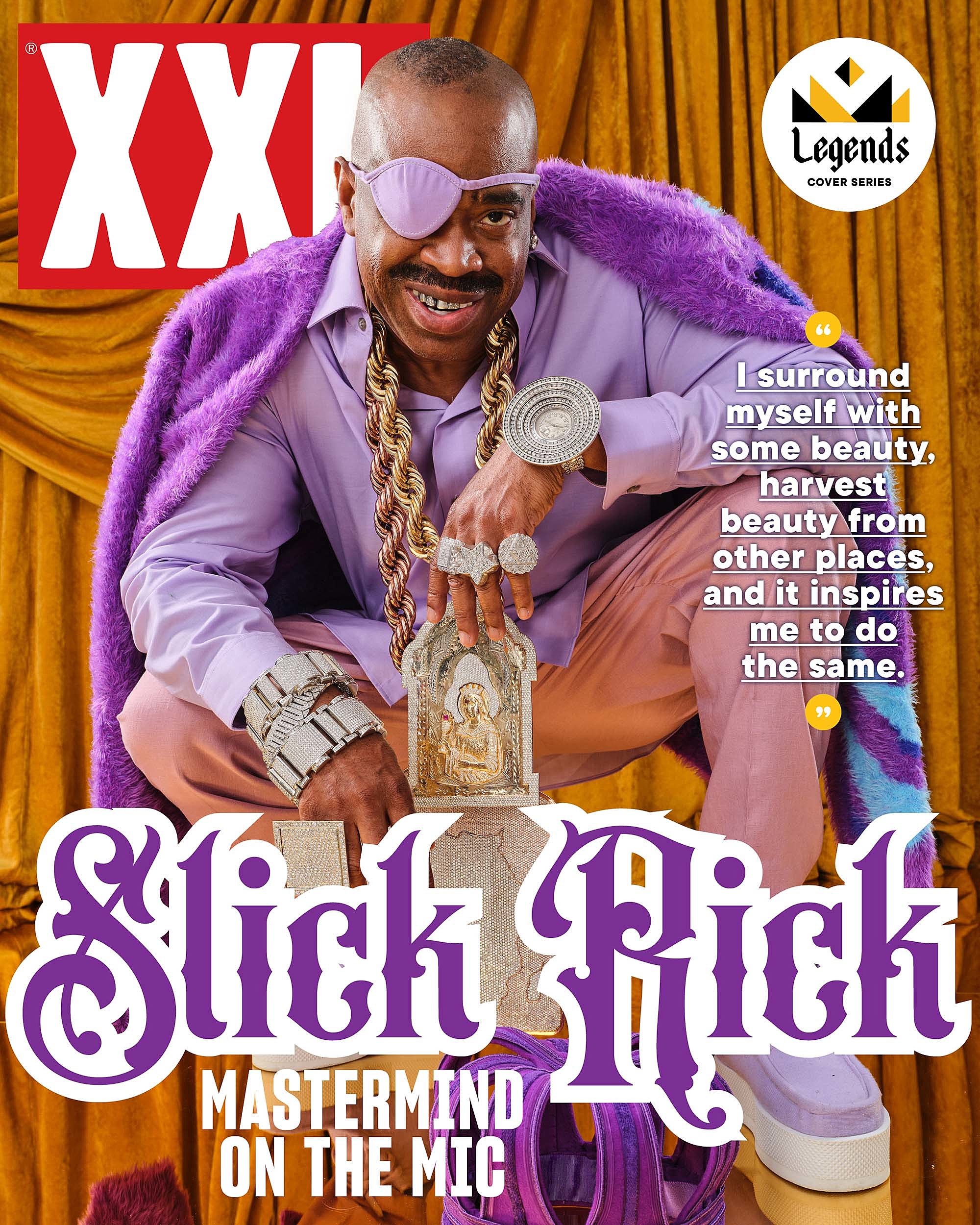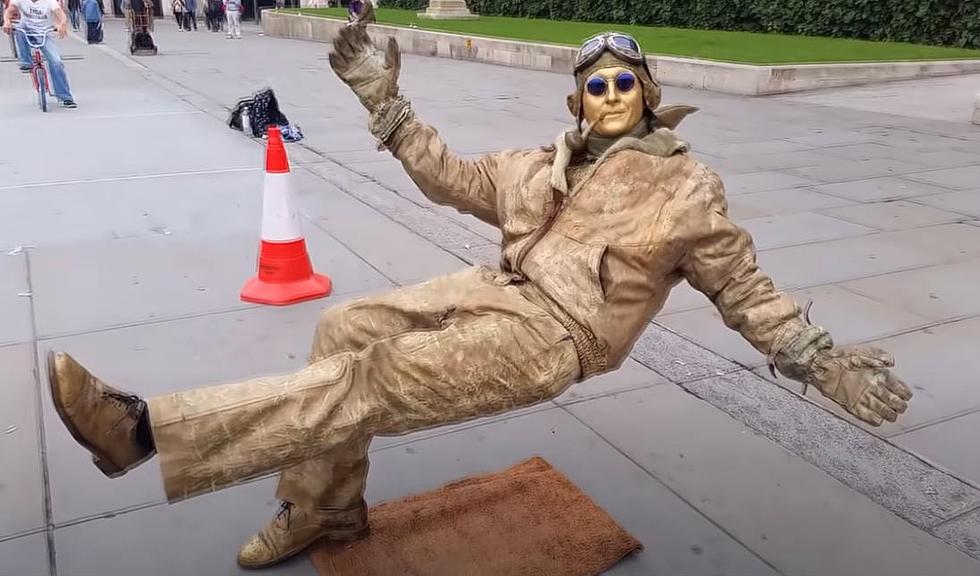
Slick Rick Da Art of Storytellin’
Interview: Vanessa Satten
Images: Ahmed Klink Set Design: Michael Sturgeon
A true hip-hop legend, Slick Rick is one of the most name-dropped, shouted-out, sampled and interpolated rappers in hip-hop history. Artists such as Tupac Shakur, Snoop Dogg, Lil Wayne, Eminem, 50 Cent, Lauryn Hill, J. Cole, Nicki Minaj, Kanye West, Jay-Z, Jeezy, Nas, Gucci Mane, Big Sean and many more have honored the British American MC in or with their music. Besides Rick's lyrical prowess and innovative use of storytelling, the rapper is known for his unique style of dressing and elaborate jewelry collection. All this combined makes Slick Rick an icon who has inspired countless other artists in the genre.
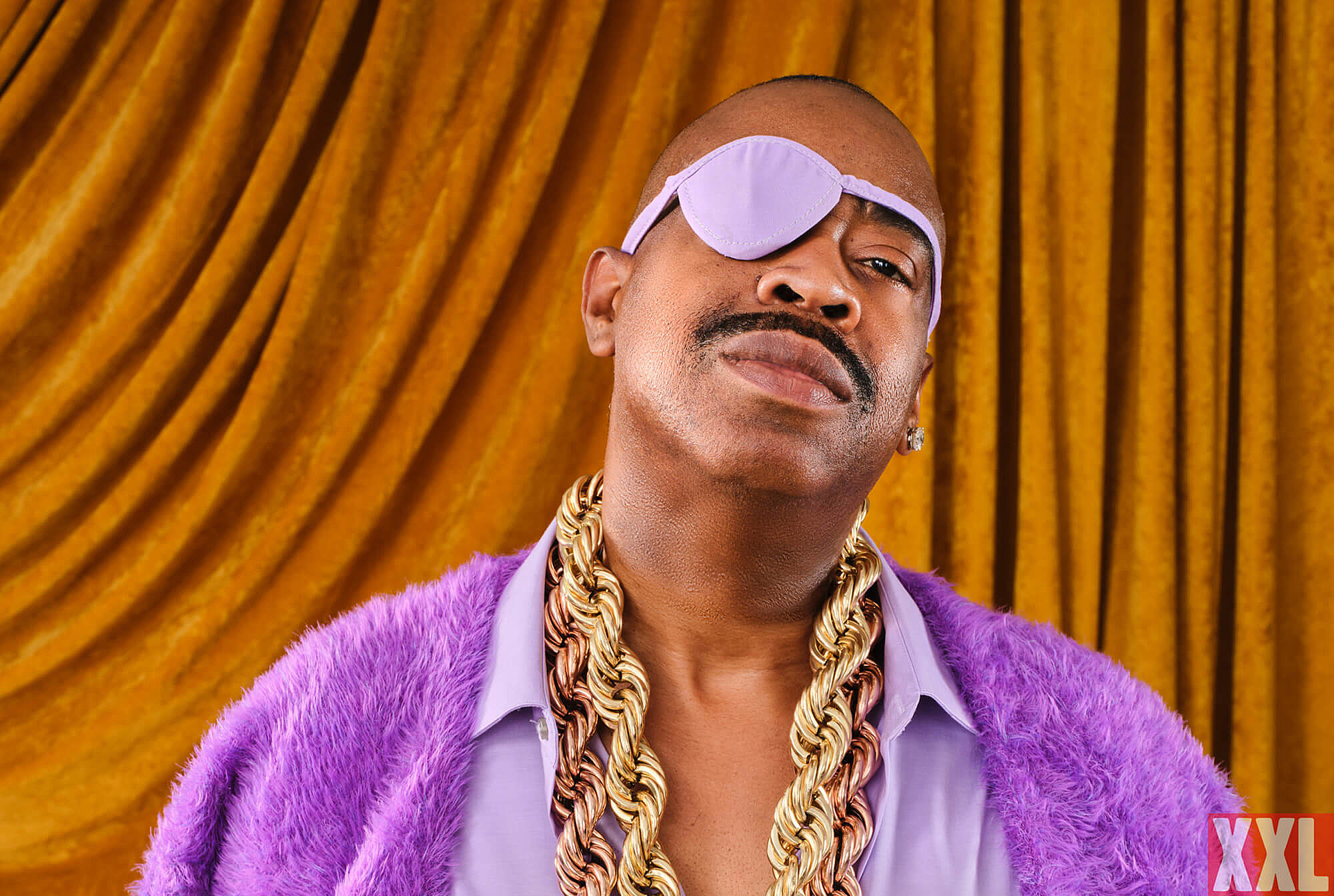
XXL: You're known very much for your style. How do you think your style has influenced hip-hop? And how did you get so stylish?
Slick Rick: I got style from the elders, the vets, you know what I mean? So, each one, teach one. The whole rap community adopted certain parts of that style. The Pro-Keds. The Pumas. British Walkers. Clarks Wallabees. And then the colors and the Kangols and the jewels. It's all part of a uniform that we each one, teach one and we all just adapted and ran with it like "My Adidas.” Run-DMC and them, you know?
"Fresh dressed like a million bucks/Threw on the Bally shoes and the fly green socks/Stepped out the house, stopped short, oh no/I went back in, I forgot the Kangol"—"La-Di-Da-Di"
Why do you think fashion became such an important part of hip-hop culture?
I think hip-hop fashion is important because it gives the bottom personality, style, like a Sammy Davis, Frank Sinatra-type of thing. Each one, teach one. If you got style, you’re gonna stand out. If you know how to play with colors, you gonna stand out. But this is the patent, the uniform. So, if I say like, a pair of Adidas, it's how you decorate it. What color Adidas? And what did you match it with? You know what I mean? It gives you a certain identity.
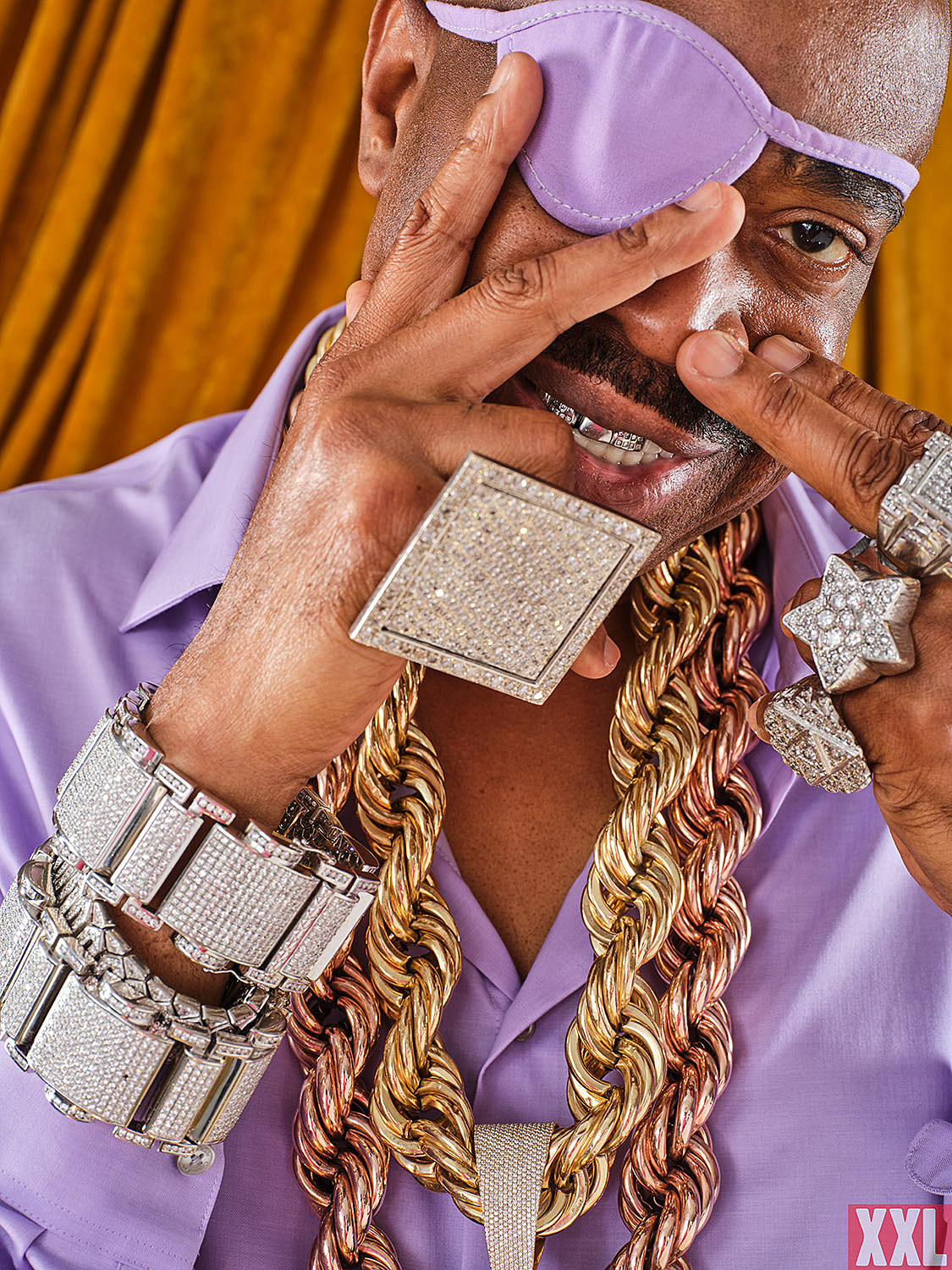
Also, you are known for your jewelry. How did that come about? Do you remember your first piece? Do you remember your significant pieces? Do you hold on to them?
The jewelry came about like trying to dress a mannequin. So, it's like trying to give the mannequin even more spark, more beauty. So, you throw on the jewels from the 1980s and now. You just add more flavor to yourself, which I called a mannequin. It's an important part of the resume, you know? Give something to look at. Shows you your status, depends on how you want to play it, you know? Shows you have style with jewelry, too. So, you put jewelry with the clothes, and you have your own identity, your own personality.
Have you kept the same pieces over the years? Did you get rid of some of them? Did you keep all of them? What's your collection like now?
As far as the jewelry goes, from back in the days, yeah, I kept most of it, you know? Because a lot of things didn't really change ’cause when I was starting off, it was the size that was most important. So, the size was established as huge in the 1980s. When it evolved, you just put diamonds on huge jewelry, which is modern now. So, size was already established, and you just have to ice the whole thing out, chain and everything, so you stay current with modern-day jewelry. Or modern-day jewelry gotta stay current with us.
How has your Jamaican culture played a role in your musical character?
It taught us style, you know? My parents are Jamaican, so, we got a lot of style from Jamaicans. The Clark Wallabees, the slacks, and the Kangol hats, and the gold teeth, and the jewelry, and stuff like that. So, a lot of style came from the Jamaican element, too. So, yeah, gave them their props.
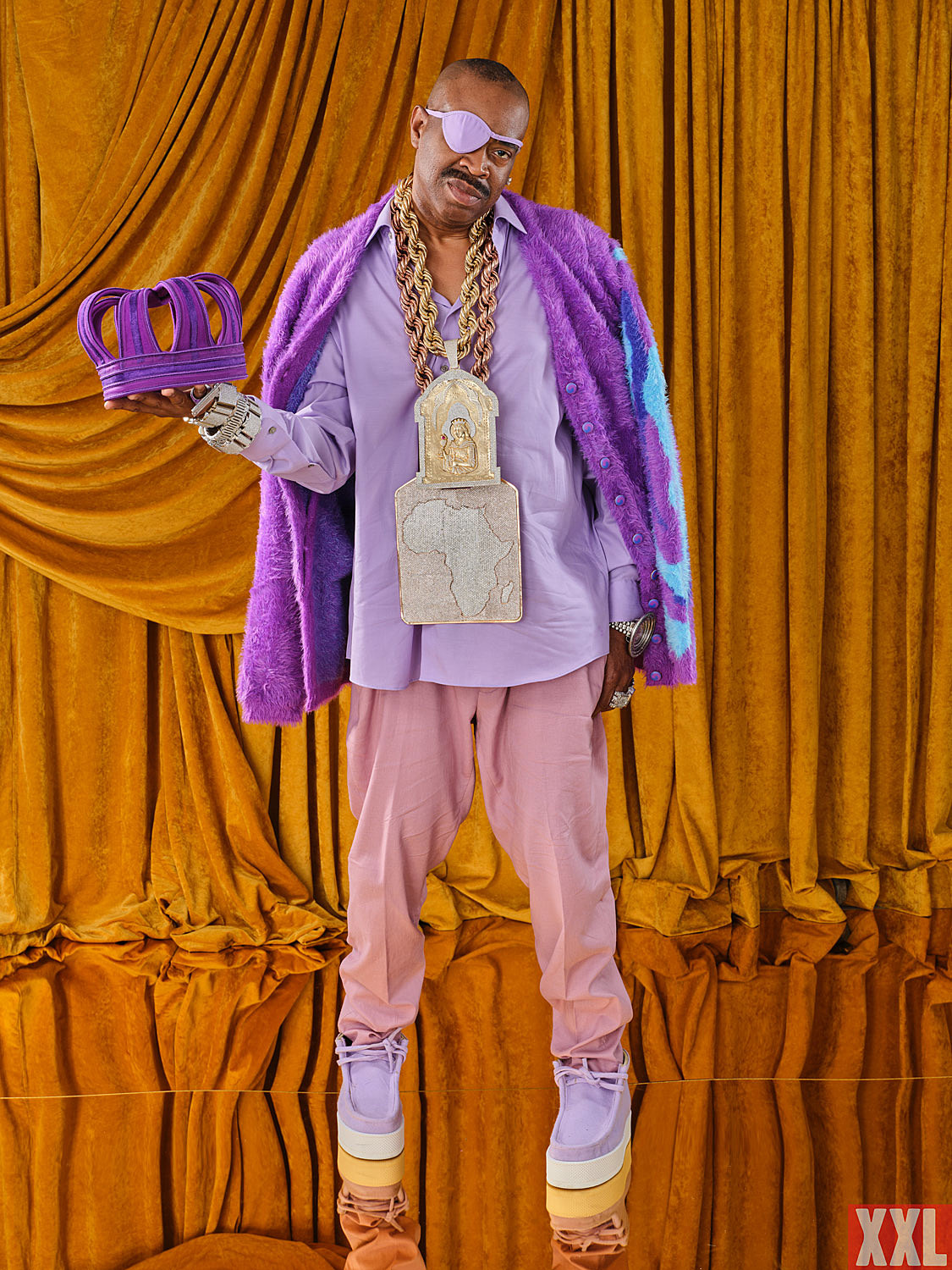
@quillemons
@skyhighfarmuniverse
Custom Crown: Heather Huey
@theheatherhuey
We’re 50 years into hip-hop and celebrating a big birthday this year. When you first got in the game did you think that you would be part of the culture for this long and that it would make it this far?
When I first made my first song [“The Show”] and it went off the charts with Doug E. Fresh, I felt I was established, you know what I mean? It was different tax brackets so we was off and runnin’. And you know, 50 years later, you look back, you're like the godfather. You got to keep the game sharp and relevant. If the kid slip or whatever is clever, you know what I'm sayin’?
What have been the highlights for you in your career, hip-hop-wise, that you have been a part of or what you've been at the head of?
I guess the highlights for me would be performing at Madison Square Garden for the first time. I used to be a mail clerk. So, going from a mail clerk to performing at Madison Square Garden was a big jump. Higher tax brackets. Large audience, you know? So, it was like leaving low income behind type of a thing. It's like a Cinderella story-type.
"Relax your mind, and folks unwind/And be kind to a rhythm that you hardly find/And off we go, let the trumpets blow/Well hold on, because the driver of the mission is a pro/The Ruler's back"—"The Ruler's Back"
Are there any moments besides Madison Square Garden or anything you are happy to be a part of that happened along the way?
I got the Lifetime Achievement [Award] from the Grammys, so that was big, you know? Like a status type of a thing. And that was recently, so I would just go with the Grammys Lifetime Achievement Award.
What makes a great rapper?
I guess identity, style, longevity, value.
What makes a great storyteller?
What makes a great storyteller is someone that can draw his audience in, and entertain them, and not bore them and they enjoy themselves. And they’re willing to pay for this element at their own leisure, you know?
What are your favorite albums that you listen to?
My favorite albums I would have to say Dionne Warwick. Diana Ross and the Supremes. The Beatles. James Brown. Stuff like that.
"Teacher, teacher, tell me how you do it/It looks kinda easy like there was nothing to it/But they don't understand that the master will be/The creator of the style (Ricky D)"—"Teacher, Teacher"
Are those artists that inspired you or who inspired you?
They all inspired me ’cause they bring beauty to the ear. And you want to have your circumference filled with beauty, ears full of beauty. I surround myself with some beauty, harvest beauty from other places and it inspires me to do the same. It's like setting the bar. You got to hit the bar or over the bar.
And from your personal catalog, what have been the most important albums for you?
I guess the most important would be like The Great Adventures of Slick Rick because that established me as an individual. The rest was good, too. But I would say established me and the rest kept me afloat.
What have been your most important singles for your career?
My favorite singles of my work would be “Children's Story,” “Mona Lisa,” “The Moment I Feared.” There’s a few more, but right now, that's it.
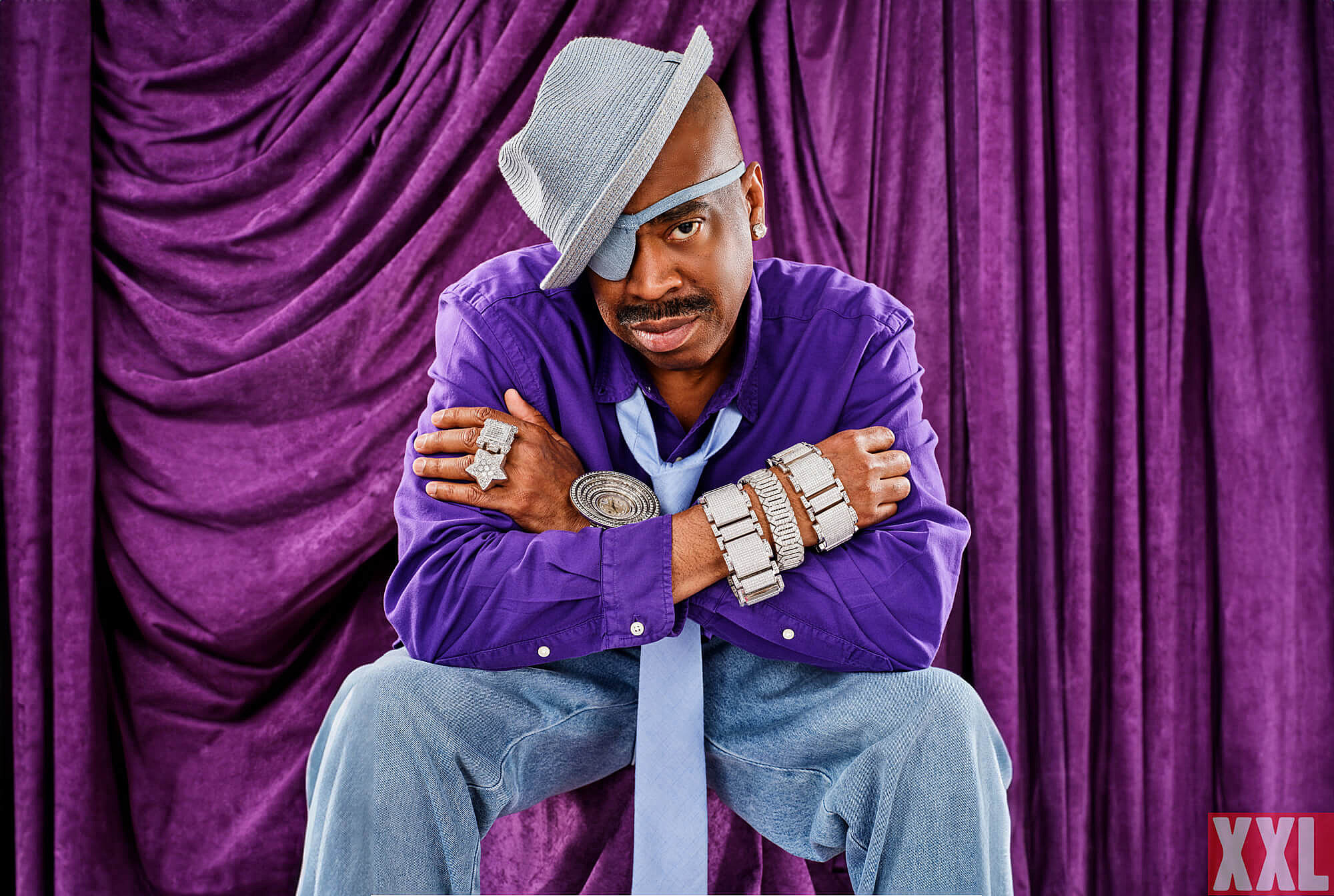
How do you feel about other artists name-dropping you in their songs?
It's an honor when artists use or sample my stuff because it keeps my name relevant in different age groups and stuff like that. So, I'm very honored that a lot of people sample and keep us in part of their structural dissonance.
What has your role been in hip-hop? What have you given hip-hop?
From what I hear from the audience is stories. They like stories so they call me the greatest storyteller and all that kind of stuff. So, I would say stories and humor in rap form. Gives a variety.
How much do you stay abreast of what's going on in hip-hop today? Do you listen to new stuff or listen to old stuff? How much is hip-hop a part of your daily life now?
I let the streets talk for themselves. If I hear a record heavy in the streets, then I'll embrace it or be intrigued about what it is that drew the public's attention to it. That's pretty much how I judge and see modern hip-hop music. If I could harvest it and bring it to my ears and it brings beauty and happiness or something I can get something out of it, I'll harvest it.
"I am such a heavy hitter/Even chandelier jealous of the patch ice glitter (bling!)/Rappers walkin' ’round, strappin' fearsome, here son/And remember your rap career's done"—"Me & Nas Bring It to Your Hardest..."
Why do you think hip-hop is so important as a music genre?
I feel it's the melting pot and the future of human interaction musically. I think it is the future. It was over 10, 20 years ago they said that rap was outselling [pop] and country put together. And that was 20 years ago, at least, you know? So, if they said that 20 years ago, then it’s like a pulpit to the world. It's all how you manage it and maneuver it.
What do you see for the future of hip-hop?
What I see for the future of hip-hop is it becoming a strong melting pot of voices to the people. A colorblind thing. Embrace all races and sexualities. Becoming the pulpit of modern intelligence.
What are you currently working on?
I got a lot cookin’ right now. Slick Rick is art.

